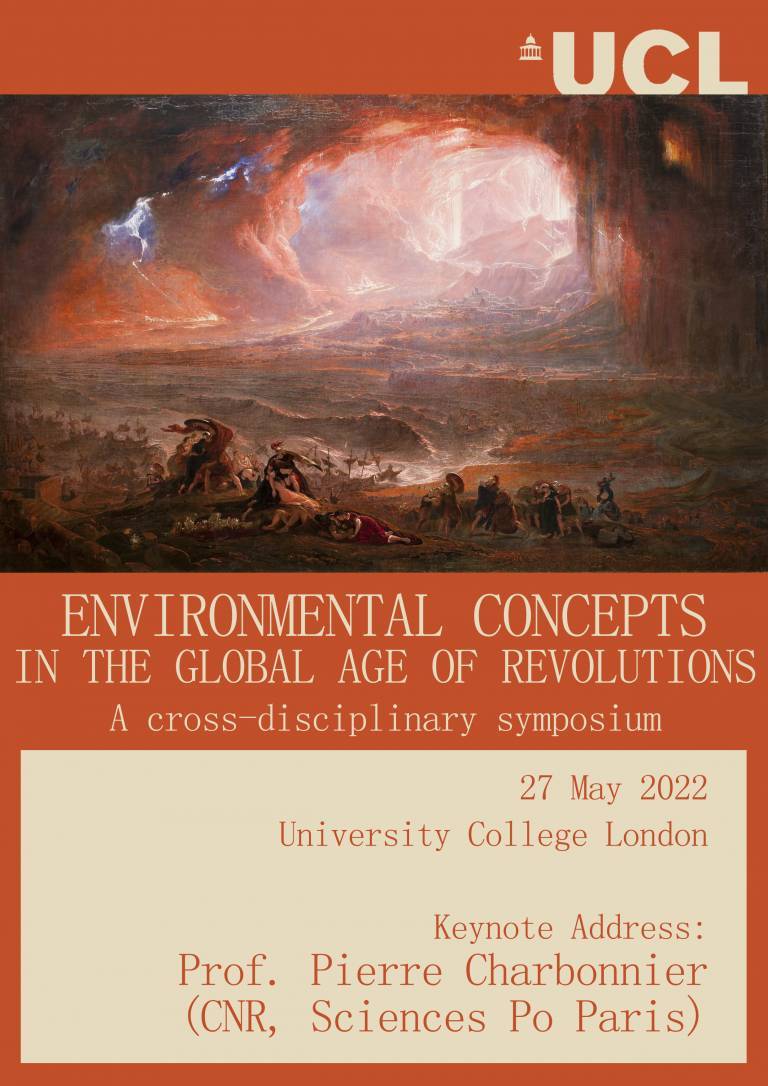Environmental Concepts in the Global Age of Revolutions (c. 1789–1914)
27 May 2022, 9:30 am–6:30 pm

This one-day conference encourages a cross-disciplinary and trans-regional discussion on the links between environmental and ecological concepts and the global revolutionary process.
This event is free.
Event Information
Open to
- All | UCL staff | UCL students | UCL alumni
Availability
- Yes
Cost
- Free
Organiser
-
UCL Anthropocene, IAS and UCL History
Location
-
Wilkins Gustave Tuck Lecture Theatre,UCL Gower StreetLondonWC1E 6BTUnited Kingdom
In recent years, the proliferation of global approaches to the so-called ‘Age of Revolutions’ of the long nineteenth century (c. 1789–1914) has reshaped understanding of this period, upending longstanding Eurocentric perspectives with a more pluralistic outlook emphasising a broader range of contexts, ideas and events. Among historians, specific revolutionary experiences have increasingly been considered in the light of global processes of integration, thereby helping uncover previously neglected linkages among geographically dispersed manifestationsof the revolutionary age. While much of this historiography revolves around arguments forseeing global revolutionary conjuncturesas a response to an experience of ‘world crisis’, a further and overlapping conceptual challenge comes from alternative perspectives on temporality and catastrophe which have developed around the notion of ‘the Anthropocene’. A key task for contemporary scholarship, therefore, is the confrontation and potential integration of new approaches focused on the impact of humans on nature, and on environmental history, with the ongoing re-evaluationsposited by global history approaches to the Age of Revolutions, and encompassing the political, intellectual, ideological, social and economic foundations of the ‘modern’ world.
Relatively little scholarly attention has as yet been placed on the environmental dimensionsof the global Age of Revolutions, and on the ways in which this signified re-orientationsof the relationshipsbetween humans and the natural environment. Similarly, very few historians have explored the extent to which the political experiences of revolution were energised by shifting spatial concepts, and novel perspectives on the interplay between the environment and human history. Furthermore, a consensus on how the global wave of Revolutions brought about an understanding of environmental change remains missing. Against this background, a growing body of literature calling for a greater emphasis on Nature and the natural inthe political, intellectual and cultural history of the modern world makes these historiographic lacunae all the more problematic. At present, scholarly perspectives are offering engaging and fruitful approaches to these challenges. Research conducted with reference to the Anthropocene, in particular, provides a newhermeneutics capable of recastingour historical understanding of human interactions with the planet, and one which invitesa critical perspective on the juncture of political and environmental imaginations during the Age of Revolutions.
This one-day conference seeks to explore these themes by encouraging a cross-disciplinary and trans-regional discussion on the links between environmental and ecological concepts and the global revolutionary process. It aims at bringing together experts from various areas of social sciences and humanities, and at drawing from the resources of neighbouring disciplines (including, but not limited to: history, philosophy, geography, politics, literature, sociology, and economics) to reflect on inter-related questions such as: how was the global wave of Revolutions of this period influenced by environmental imaginations? To what extent did these Revolutions engender new perspectiveson the relationship between humans and the natural environment? How did the experiences of crisis in different settings of global revolution signify a growing awareness of ecological change? And how did shifting notions of land, territory and space, broadly conceived, relate to visions of state-and polity-building?
Draft programme
9:45 welcome/coffee
10:00 opening remarks: Alessandro De Arcangelis (UCL) and Simon Macdonald (UCL)
10:15 panel 1: Resources and Revolution (3 papers of 30 minutes each followed by 30 minutes of discussion)
Jacopo Bonasera (Bologna) “The Nature of Property: Scarcity and Revolution in Malthus’s Political Thought”.
Conor Bollins (QMUL), “Montesquieu on the Depopulation of the Universe: Conceptions of Bio-Catastrophe prior to the Age of Revolutions”.
Peter Morgan (UCL), “No Sovereigns in Eden: Discourses of Natural Abundance and the Undermining of State Sovereignty in Spanish America, c. 1790–1830”
12:15 lunch
13:15 panel 2: Environment and Ecosystems (3 papers of 30 minutes each followed by 30 minutes of discussion)
Alessandro De Arcangelis (UCL), “Mapping the World Spirit: Environmental Concerns in Hegel’s Political Thought”
Rowan Boyson (KCL), “Mary Wollstonecraft and the Atmosphere of Revolutionary Feminism”
Antonio Ferraz de Oliveira (Cambridge), “André Siegfried, ‘La France Terrienne’ and ‘Crisis of Continents’, c. 1900–1955”
15:15 break
15:30 roundtable discussion: details TBC
16:00 concluding remarks: Sujit Sivasundaram (Cambridge)
16:15 break
16:30 keynote: Pierre Charbonnier (CNRS/Sciences Po, Paris)
All welcome. Please follow this FAQ link for more information. All our events are free but you can support the IAS here.
 Close
Close

